Impact Stories from Economic Impact Policy Area
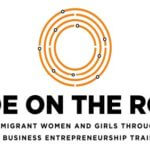
Fellow’s initiative wins Harvard alumni impact contest
Fellow(s): Shatha Jayyousi
Country: Jordan
Cohort: 2013
Policy Area(s): Economic Impact, Education Diplomacy/Mentoring, Empowering Women and Girls, Entrepreneurship, Professional Growth, Youth Engagement
This week, it was announced that Code on the Road, the initiative launched by 2013 fellow Shatha Jayyousi, was chosen as the winner for the Harvard Arab Alumni Association impact competition.
The Harvard alumni initiative, 3arabi, aims to support implementation of innovative projects that positively impact the Arab world. Code on the Road is a 2018 AEIF-winning project that empowers migrant women and girls through software and business entrepreneurship training in Athens and Amman.
As the winner, Code on the Road will be matched with an advisory group of representatives from the public and private sectors who will support them through investment, team-building support and strategic partnerships. Shatha and her team will also present their initiative at the upcoming Harvard Arab World Conference in Dubai.
Report Date...: 10/14/19

Fellow featured as tech leader and social impact advocate
Fellow(s): Christa Munezero
Country: Rwanda
Cohort: 2018
Policy Area(s): Economic Impact, Empowering Women and Girls, Professional Growth
Last month, 2018 fellow Christa Munezero was featured by Nsesa Foundation for her work in ICT and her commitment to using tech for social good. Nsesa, a STEM non-profit that educates and trains youth in Africa, features leaders in STEM fields for their ongoing “STEM Wow” series. Christa is the COO of Tap & Go Wifi at the AC Group Rwanda.
In her interview, Christa speaks about her passion for tech, her advice for women in STEM fields and her TechWomen experience. She highlighted her team’s 2018 seed grant-winning initiative, Healing Together, sharing that their work addressing women trauma survivors’ mental health has been her greatest achievement. She concluded the interview with her advice for women in STEM fields: “Do not give up – humble beginnings can create better opportunities.”
Report Date...: 10/14/19
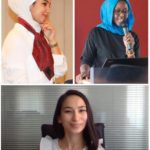
2019 Emerging Leaders share perspectives on TechWomen blog
Fellow(s): Sitora Salaeva, Zani Gichuki, Esra’a Alsanie
Country: Jordan, Kenya, Uzbekistan
Cohort: 2019
Policy Area(s): Economic Impact, Empowering Women and Girls, Entrepreneurship
Recently, three 2019 Emerging Leaders wrote guest blogs in our returning blog series, Emerging Leader Voices. In their posts, Sitora Salaeva of Uzbekistan, Zani Gichuki of Kenya and Esra’a Alsanie of Jordan shared their perspectives on being women in STEM fields. In Arriving at my dream, Sitora – who applied to TechWomen four times before being accepted – spoke about often being the only woman on her team or in her department, prompting her to become an advocate for gender equality in the workplace.
At the age of 14, Zani was asked whether she’d rather be the wife of a doctor or an engineer. Now a civil engineer herself, Zani shares her perspective in Defying expectations: my journey in STEM. In our final guest blog post, Esra’a offers insight on how to accept and overcome obstacles. As founder and CEO of an edtech startup, Esra’a credits remaining flexible as a crucial factor to her success. Read her key takeaways in You can only connect the dots looking backward.
Report Date...: 9/30/19
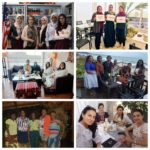
Mentor(s): 2019 Emerging Leaders
Policy Area(s): Economic Impact, Education Diplomacy/Mentoring, Empowering Women and Girls, Entrepreneurship, Environmental Sustainability, Professional Growth, Youth Engagement
On Sunday, IIE welcomed the arrival of the 2019 cohort of 108 Emerging Leaders from 21 countries. This year’s Emerging Leaders will join TechWomen’s network of over 300 Professional Mentors, Cultural Mentors and Impact Coaches – and an alumnae community of over 600 fellows and 700 mentors – as they embark on five weeks of mentorship and professional exchange.
This year’s 40 host company partners include Glassdoor, 23andMe and Salesforce; the program is also welcoming a group of new host companies, including Airbnb, SurveyMonkey, Okta and Zume. TechWomen’s first week of programming includes the Cultural Kickoff, where Emerging Leaders will showcase the rich culture of their home countries, as well as Action Plan Workshop 1, where country teams will establish the foundation of their action plans alongside their Impact Coaches.
Leading into the program, three 2019 Emerging Leaders wrote guest posts on the TechWomen blog in the series Emerging Leader Voices, sharing their perspectives as women in STEM and highlighting and their achievements, challenges and life lessons. Follow along as we provide #techwomen19 updates on Twitter, Instagram, and the TechWomen blog!
Report Date...: 9/23/19

Fellows establish Uzbekistan’s first green tech accelerator
Fellow(s): Saida Yusupova, Elena Selezneva
Country: Uzbekistan
Cohort: 2016
Policy Area(s): Economic Impact, Education Diplomacy/Mentoring, Entrepreneurship, Environmental Sustainability, Professional Growth
Recently, 2016 fellows Saida Yusupova and Elena Selezneva organized
Uzbekistan’s first green startup accelerator program. The accelerator,
Water Solutions Innovation Lab, was established for green business
startups that are working to advance green technologies and solve water
challenges.
The accelerator was implemented by Saida’s company, Green Business
Innovation, and founded with a mission to create awareness about
environmental challenges and bring the latest innovative technologies to
the agricultural and environmental sectors within the country. Earlier this
year, the innovation lab accepted 12 startups into an intensive six month
program, and became the first Uzbek program to partner with
ClimateLaunchpad, the world’s largest green business ideas competition.
During the program, ClimateLaunchpad’s founder and lead trainer
traveled to Uzbekistan to conduct a two-day bootcamp for participating startups.
The program culminated with a Demo Day in August, held in partnership with ClimateLaunchpad, where the teams pitched a group of judges and local investors. The two winning startups were invited to the ClimateLaunchpad Grand Finale in Amsterdam, which will be held in November. VIOM, the team that won first place, consists of two women who are producing water-soluble and biodegradable products for agricultural applications.
Report Date...: 9/2/19

Fellow speaks at international conference in Japan
Fellow(s): Patu Ndango Fen
Country: Cameroon
Cohort: 2017
Policy Area(s): Economic Impact, Entrepreneurship, Environmental Sustainability, Professional Growth, Youth Engagement
Last month, 2017 fellow Patu Ndango Fen was a featured panelist at the Tokyo International Conference on African Development. The conference is initiative of the Japanese government and held in partnership with the United Nations Development Program, World Bank and the African Union Commission.
Patu is the founder of Closed Loop System Ventures, a waste management social enterprise, as well as the president of its foundation. In one panel, “Human Capital Development for Youth Entrepreneurship,” Patu spoke about innovative education approaches that empower and engage youth. “Africa has a young population and is experiencing a rapid growth rate,” she said. “Young people should be encouraged to venture into entrepreneurship in order to create jobs and contribute to resolving pressing social, environmental and economic challenges.”
Report Date...: 9/2/19
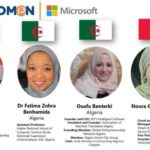
Fellow named first Algerian Microsoft Regional Director
Fellow(s): Ouafa Benterki
Country: Algeria
Cohort: 2012
Policy Area(s): Economic Impact, Entrepreneurship, Professional Growth
This month, 2012 fellow Ouafa Benterki was named a Microsoft Regional Director, making her the first Algerian and first African woman to occupy the role.
Established in 1993, the Microsoft Regional Director program selects 160 of the world’s top technology visionaries who are chosen for their community leadership and commitment to technology. Each Regional Director is nominated and selected by Microsoft employees based on a competitive and rigorous evaluation process. Ouafa will act in a non-paid advisory role, fulfilling a two-year term where she will play an integral role in bringing community feedback and customer needs to senior Microsoft leadership, including Microsoft CEO Satya Nadella.
Last year, IIE partnered with Microsoft to provide full registration for four TechWomen fellows to attend Microsoft Ignite 2018 in Orlando, Florida. Ouafa, one of the four fellows selected, was featured in two sessions and had the opportunity to speak about her work as the CEO and founder of MTY Intelligent Software, the first Algerian women-led startup specializing in intelligent systems. “If I didn’t attend MS Ignite last year, it wouldn’t be possible for me to be selected for this,” said Ouafa. “Microsoft discovered my leadership in technology thanks to IIE.”
Report Date...: 8/19/19
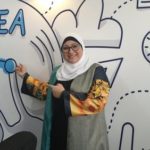
Fellow leads bootcamp for emerging women in tech
Fellow(s): Ala’a Agha Karss
Country: Jordan
Cohort: 2017
Policy Area(s): Economic Impact, Empowering Women and Girls, Entrepreneurship, Professional Growth
This week, 2017 fellow Ala’a Agha Karss concluded a two-month tech bootcamp for women in Riyadh, Saudi Arabia. The training, Pink Android Bootcamp, was designed and led by Ala’a,
the founder and CTO of Superiors TechHub. Although Ala’a frequently leads the training for women in Jordan, this was her first opportunity to bring her curriculum to women in Saudi Arabia.
Over the course of the intensive training, Ala’a led 53 women in sessions on coding, mobile app development, design thinking and developing an entrepreneurial mindset. Together, the women created innovative projects and built mobile platforms that addressed leading issues in their communities. At the end of the training, the women pitched their platforms to a jury of innovation labs, connecting to entrepreneurs and companies that can help bring their projects to life.
Report Date...: 8/5/19

Fellow shares hiring expertise with local tech companies
Fellow(s): Sarah Abdallah
Country: Lebanon
Cohort: 2016
Policy Area(s): Economic Impact, Entrepreneurship, Professional Growth, Youth Engagement
Recently, 2016 fellow Sarah Abdallah shared her expertise on tech hiring at an event organized by Lebanese IT Syndicate, a group that represents the Lebanese IT community and ICT sector. Sarah is the CEO of LIBRO, a company that addresses youth unemployment challenges in the MENA region by providing training, consulting and recruitment services for universities and companies in STEM fields.
At her talk, Sarah shared hiring tools companies can use to fulfill their open positions and reduce the unemployment rate of people with technical backgrounds. Part of the issue, Sarah explained, is that companies don’t always know how to draft proper job descriptions for their open positions. She showed how companies can be specific by listing particular programming languages and educational backgrounds necessary for the jobs they need to fulfill. Sarah also encouraged the group to form committees to support tech companies in drafting job descriptions: “This would both ease recruitment and retain talent,” she said.
Report Date...: 7/29/19

Fellow launches coworking space for female founders
Fellow(s): Baratang Miya, Zimkhita Buwa
Country: South Africa
Cohort: 2013, 2015
Policy Area(s): Economic Impact, Empowering Women and Girls, Entrepreneurship, Professional Growth
This month, 2015 fellow of South Africa Baratang Miya launched Uhuru Spaces, a coworking space designed to bring together and support female founders. The space will provide women access to workshops, networking opportunities and special events with investors and entrepreneurs.
Baratang, the founder of Girlhype, conceived of Uhuru Spaces with the help of 2013 fellow Zimkhita Buwa. “After TechWomen, I resigned from my full-time job but felt coworking spaces were a waste of my time,” says Baratang. “After explaining to her why I think they don’t work especially for us women, she looked at me and said, ‘then let’s start our own.’”
Uhuru Spaces officially opened with an event and panel that featured mentor Eileen Brewer, who shared her advice on angel investing and pitching. In the next 10 years, Baratang hopes to provide 10,000 women access to new business opportunities. “This has been a lifelong dream, and the biggest mission so far,” she says.
Report Date...: 7/22/19

